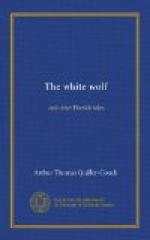The terrier awoke, yawned, and was waddling down from its couch to make friends, when Master Dick returned.
“Mother wants to know who you are and what’s your business. Gerty wouldn’t come down when she heard you weren’t Jack Phillips.”
“Then tell your mother that I am your uncle, John Flood. That will satisfy her, perhaps.”
“Whe—ew!” Dick took him in from top to toe, in a long incredulous stare; but turned and went without another word.
It may have been five minutes before the door opened and Mrs. Flood entered, with an air nicely balanced between curiosity, hauteur, and injured innocence—a shabby-genteel woman, in a widow’s cap and a black cashmere gown which had been too near the frying-pan.
“Good morning.”
Mrs. Flood bowed stiffly, not to say stonily, folded her wrists accurately in front of her, over her waistband, and waited.
“I am John Flood, you know—poor Lionel’s brother. I have just come from Cudmore & Cudmore’s, the solicitors, to talk with you, if I may, about this will. It seems that I have a legacy, but beyond this I know nothing, and indeed until Messrs. Cudmore wrote I wasn’t even aware of an illness.”
Mrs. Flood’s eyes seemed to answer, if such a thing could be said in a ladylike way, that he might tell that to the Marines. But, without relenting their hostility, she took occasion to mop them.
“It was a cruel will,” she murmured. “My husband and I had differences; in fact, we have lived apart for many years. Still—” She broke off. “You know, of course, that he went wrong—took to living with natives and adopted their horrible ways—in the end, I believe, turned Hindu.”
“God bless my soul! But he used to write regularly—up to the end.”
“No doubt.” The two words were full of spiteful meaning, though what that meaning was Parson Jack could not guess.
“His letters gave no hint of—of this.”
Again Mrs. Flood’s bitter smile gave him—politely—the lie.
“He drank, too,” she went on, after a cold pause. “I had always supposed it was the one thing those natives didn’t do. We thought of contesting the will on the ground of undue influence and his mind being gone.”
“Did Lionel leave them much, then?”
“’Them’?” she queried.
“His friends over there—the natives.”
“He left nothing but this legacy of five thousand pounds, and the residue in equal shares to his poor family.” Here her handkerchief came into play again. “Only, as it turns out, there isn’t any residue— scarcely a penny more when all is realised—except the pension, of course.” Unmasking her batteries with sudden spite, she added, “Even between you I couldn’t be robbed of that!”
Parson Jack controlled himself. He was genuinely sorry for the woman. But either cheek showed a red spot and his voice shook a little as he answered, “This is a trifle gratuitous, then—your talk about undue influence.”




